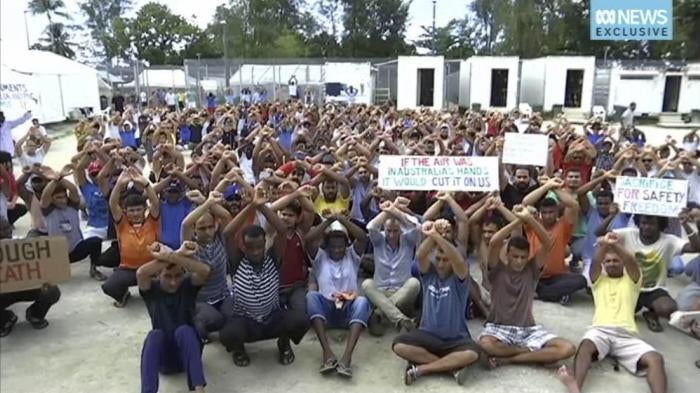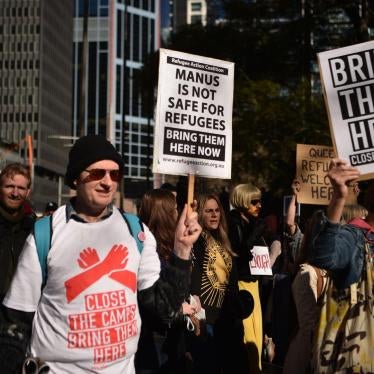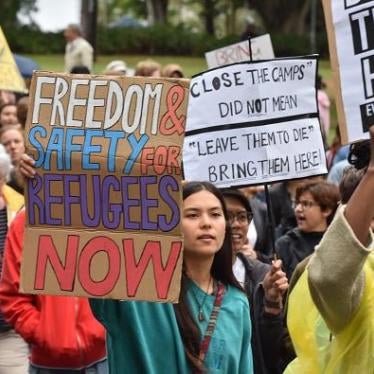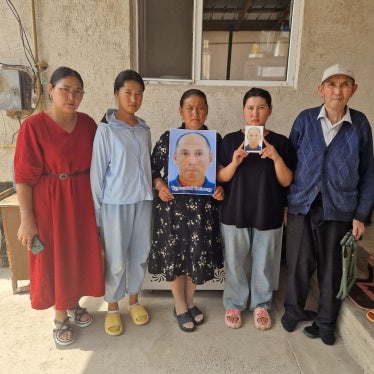On February 13, 26-year-old Sudanese refugee, Aziz Muhamat, won a prestigious international human rights prize, the Martin Ennals Award, in Geneva, Switzerland. Winners are selected because of their deep commitment to human rights, often working under threat of detention, torture, or worse. Last month, a Kurdish refugee from Iran, Behrouz Boochani, won Australia’s richest literary prize, the Victorian Prize for Literature.
Both men achieved this recognition despite Australian government efforts to hide them away on Manus Island in Papua New Guinea since 2013. Muhamat and Boochani, who both fled repression at home, have suffered greatly in those five years, separated from their families, witnessing violence. They were detained for some of those years in a closed camp for men on an isolated naval base, and now are held in “transit” facilities where they remain under a 12-hour curfew with inadequate medical care and an unclear future.
Muhamat and Boochani were forcibly sent to these facilities, along with more than 3,000 other men, women and children as part of a policy under which anyone seeking asylum in Australia by boat is intercepted and sent to offshore camps on Manus or the Pacific island nation of Nauru. The government reinstated offshore processing after a national campaign of fear-mongering about boat migration. The draconian policy remains in place.
Australia’s leaders hoped that by sending people to remote Pacific islands with limited access to media or international observers, they would remain out of sight and thus out of mind. The government even penalized people working in the centers for speaking out about what went on there.
Instead of silence and invisibility, five long years of detention have turned these men into global icons as they exposed the abuses and inhumane conditions of the offshore facilities. I have met with both of them. They helped Human Rights Watch to document inadequate health care and violence in the Manus community against asylum seekers and refugees.
Behrouz tapped out his award-winning novel "No Friend but the Mountains," one WhatsApp message at a time. He recorded a feature-length documentary, Chauka, Please Tell Us the Time, on his mobile phone. Aziz’s WhatsApp voice recordings with a journalist resulted in an award-winning Australian podcast, "The Messenger".
I first spoke with Aziz in July 2015 on my first visit to Manus Island. We could not meet face to face because he was detained in the closed detention center. But we spoke by phone (surreptitiously as mobile phones were then banned in the center) as he explained the prison-like system of daily life inside the camp, the use of solitary confinement as punishment, and his experiences of being jailed in a Papua New Guinea police station after a hunger strike by detainees. I met Aziz and Behrouz in person when I returned to Manus in September 2017.
As Aziz and Behrouz begin to garner global recognition, the Kafkaesque absurdity of Australian government policies has been on full display as the government rallies against a new law that will allow urgent medical transfers from Manus and Nauru to Australia on the recommendation of two doctors. The law is necessary because the Australian government has repeatedly delayed or denied medical transfers of refugees and asylum seekers, sometimes for months or years, ignoring the recommendations of Australian doctors. Many were only transferred following the start of legal proceedings.
Twelve refugees and asylum seekers have died on Manus and Nauru since 2013, six of them suicides. The 2018 coroner’s report on Hamid Khazaei, an Iranian, found that his death was “preventable” and resulted from “a series of clinical errors, compounded by failures in communication that led to poor handovers and significant delays in his retrieval from Manus Island".
Despite the new law’s humanitarian focus, it has faced vociferous opposition from the government. Prime Minister Scott Morrison and cabinet ministers have gone on the offensive with fallacious claims that the narrowly drafted law will dismantle border protection and allow a resurgence in people smuggling in Indonesia. The government also announced the re-opening of the Christmas Island detention center.
Aziz and Behrouz have been at the forefront of exposing the horrors of Australia’s offshore processing system. Their awards are a triumph for refugees everywhere, and an embarrassment to the Australian government, whose cruel policy toward refugees casts a lasting stain on Australia’s global human rights reputation.










